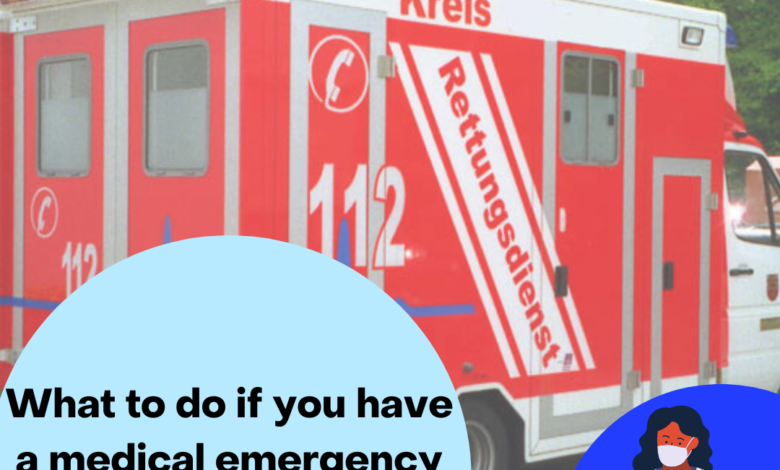What to do if you have a medical emergency in Germany?

What to do if you have a medical emergency in Germany?
You have a job set up, health insurance arranged, and a place to live when you just arrived in Germany. However, what should you do if you suddenly wake up in the middle of the night with severe stomach pain? Or what happens if you are riding your bike home one day and you have an accident?
Several newcomers to Germany are now aware of the variety of choices accessible to them in the event of a medical emergency. Many Germans don’t even realize this, which is why unnecessary calls to the emergency ambulance service frequently occur.
It’s crucial to be aware of the specific services you may access in Germany, as well as their phone numbers, in order to not only act quickly in the event of a medical emergency but also to avoid clogging up the emergency services’ communication channels and running up unnecessary bills.

What sort of emergency medical services are offered in Germany, and how can you get in touch with them?
You simply need to call on 112 and 116 and 117:
When it comes to health emergencies, German residents should keep in mind that there are two emergency numbers to remember: 112 and 116 117.
Emergency cases should dial 112, while for urgent but non-life-threatening situations should dial 116 or 117. Here is a breakdown of who you ought to call in certain circumstances.
When you need to dial 112:
This number is functional throughout the whole European Union, not only in Germany. It is only used in severe cases that might be life-threatening, such as:
-
-
-
- Heart attack signs (severe chest pain, shortness of breath, cold sweat)
- Stroke warning signs (impaired vision, speech, symptoms of paralysis)
- Accidents that result in significant bleeding or injury
- Getting dizzy or unconscious
- Anaphylactic shock (anaphylaxis)
- Intense pain
- Severe burns
- Attack of asthma (attack-like shortness of breath)
-
-
You should still call 112 to be safe even if you’re not sure if the situation is life-threatening!
If necessary, an emergency doctor will also be sent when this emergency number is dialed, along with the appropriate emergency vehicle (such as an ambulance). Most of the time, if an ambulance transfer is required for a medical reason, your health insurance company will pay the related expenses.
Look into private health insurance choices if you want extra perks, such as senior doctor care or a private room at the hospital, during an emergency. You can get supplemental health insurance if you already have public health insurance.
When you need to dial 116 117:
The “on-call” emergency service in Germany is available 24/7, including on weekends, holidays, and evenings. This is for medical emergencies that are not life-threatening, such as:
-
-
-
- Colds
- Fever and discomfort with flu-like illnesses
- Throat, nasal, and ear infections (ENT)
- Stomach diseases accompanied by diarrhea and vomiting
- Migraine
- Lumbago
-
-
If you phone this number and are unable to travel, you will be directed to on-call clinics that you may attend or that can visit you at home. All expenses are paid by your health insurance company because the medical on-call service treats both public and private customers.
Finding a local doctor who speaks English
What if you only need general medical assistance? Google “English-speaking physicians in [enter your postcode and/or city]” is our best recommendation. There is a list of medical professionals there, from general practitioners to specialists. That’s all there is to it!
-
- You are free to choose any doctor you like if you have complete private health insurance. However, if you are a patient of the public system, you must make sure that the doctor you choose accepts “Kassenpatienten” (someone who is covered by public health insurance). Some private doctors do not accept patients with government insurance.
- A health insurance broker can assist you in locating the best health insurance company for you if you’re looking for comprehensive coverage that gives you the freedom to choose any doctor and alternatives to meet both your lifestyle preferences and medical needs.
- Being proactive and acquiring the appropriate coverage before being ill is also crucial, since switching providers or purchasing a complete private health insurance policy may become very challenging and expensive once you begin to have reoccurring problems or require continuous treatments.
Everyone needs urgent medical treatment at some point in their lives, therefore it is practically a given that one must act quickly and appropriately to save their life. The knowledge of what to do in a medical emergency is important for everyone in Germany.
Also, Read
Ausbildung in Germany: Everything You Need to Know
City Anmeldung in Germany- Everything you need to know
8 Important Things To Do After Reaching Germany
Visit our website for more articles related to studying in Germany.
Follow us on Instagram and Facebook for more tips & information on studying in Germany.

